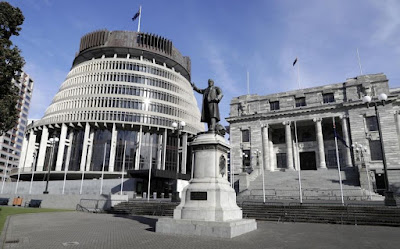 |
| Problem Solved? When all other options are exhausted, the firing squad remains. As Joseph Stalin is said to have declared: “Eliminate the person, eliminate the problem.” |
THE BEST GUESS I can offer as to the author of the line is William Brandt. He wrote scripts for the 1990s New Zealand television crime series “Duggan”, starring John Bach as an introverted police inspector brooding morosely over the Marlborough Sounds. What was the line? As I recall, it was put in the mouth of an ageing communist, who had reduced his entire ideology to one brutal sentence: “Nationalise everything – and shoot the buggers who complain!”
As an honest summation of the Soviet Union under Joseph Stalin, that line (whoever wrote it) is pretty hard to beat. Indeed, anyone who seriously proposes socialism as a solution to the world’s woes is being disingenuous if they suggest that the Red Dawn, should it ever arrive, will be the product of anything other than crushing centralised control and many, many, executions.
The problem is that it is difficult to present a society in which the local hairdressing salon has 150 chairs, and where critics of the government regularly disappear, as the sort of country in which anybody with a yearning to breathe free, or wear a striking hair style, would ever want to live.
If you’re a socialist living in a liberal democracy, the problem is compounded ten-fold. In those circumstances, the socialist paradise that must be painted has to strike one’s audience as appreciably better than the capitalist economy they currently inhabit. How is the orthodox comrade supposed to answer when asked: “Why would we trade games-consoles and Gucci fashion accessories for the guns and gulags of totalitarian communism?”
Not honestly, for a start. Or, at least, not when you’re addressing anyone who isn’t already so far ground down by the cruelties of capitalism that “guns and gulags” present themselves as intriguing possibilities.
For everyone else, the party line is simple. Guns and gulags are the inevitable outcome of revolutions that take place in under-developed peasant societies where freedom and prosperity have, for centuries, been the stuff of dreams. Socialist revolutions in advanced capitalist societies could only be expected in the most evolved democratic states. What need would the “democratic socialists” growing up in such states have of guns and gulags? Who needs the grim instrumentation of coercion when one’s society is already blessed with a modern and “progressive” education system?
Ah, “Education” – the answer to every problem. Whenever I queried my left-wing comrades about the fate of “the buggers who complain”, a steely glint would, for the briefest of moments, enter their eyes (as if they were picturing the people’s firing-squads in action) only to be followed, just as quickly, by an expression of kindly warmth.
“What would people have to complain about in a society where, thanks to an education system dedicated to undermining the hegemony of all oppressive structures, social justice can flow down like streams from the mountains?”
Such faith in the power of pedagogy! How proudly these comrades would describe their future Commonwealth of Unanimity, in which all accept the truths of socialism, and where teaching is the most revered profession.
And those issues which have always divided humanity: the limits of freedom; the morality of coercion; the inviolability of the individual human conscience; the sanctity of human life; the claims of the divine. How would our kindly socialist teachers prevent these profound questions from tearing their treasured Commonwealth of Unanimity apart?
Not an original question. And their answers were also lacking in novelty. Any failings in the process of eliminating the systems of oppression would have to be rectified by re-education.
And that is where the socialists’ castle in the air begins to disintegrate. Because that word, “re-education”, so often paired with “camp”, cannot help but draw a veil of darkening clouds across the future’s bright sky.
Ask the Uighurs of Xinjiang about the perils of “rectification through re-education”. Ask them about the high-rise complexes in which the tens-of-thousands giving incorrect answers to socialist questions are required to submit themselves to the pedagogy of raw political power. Day after day, week after week, until the lessons are mastered, and the rectified Uighur students are released into the warm embrace of the Peoples Republic’s agreed answers.
And the ones who refuse to submit to this nationalisation of their conscience? The buggers who keep complaining?
We all know the answer to that question.
They are shot.
This essay was originally published in The Otago Daily Times and The Greymouth Star of Friday, 21 June 2024.








